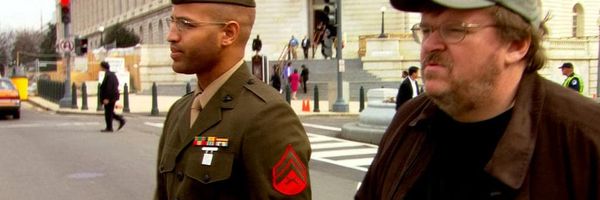Eye For Film >> Movies >> Fahrenheit 9/11 (2004) Film Review
Fahrenheit 9/11
Reviewed by: Andrea Mullaney

This is a shattering film. After the Hutton Report, dozens of TV documentaries and reams of journalism, even those who aren't news junkies might feel there's nothing about September 11th, Afghanistan and Iraq that Michael Moore can tell them. They're wrong.
In a film which is a much sharper, more heart-rending howl of rage than any of his work so far, the activist filmmaker presents evidence and compiles footage which seems new. But more than that, it's the way he puts it all together, from George W Bush's disputed election victory, his initial fumblings after the terror attack and subsequent seizing of business opportunities, to the way the American military signs up teenagers from the poorest areas, that builds into a devastating and truly shocking indictment.

Is it biased? Well, duh! Does he get in a few cheap jokes about how politicians are groomed for the cameras, or how Dubya is an awkward, dopey public speaker? Yes, naturally. But this is a more serious attack than his TV work or previous films, which lays off the sometimes laboured publicity stunts to compile factual evidence of hypocrisy around Bush's circle. Moore shows in convincing detail the links between the President's family and business relations, the Saudi Arabian government and the bin Laden family, raising questions that, it's hard to believe, have been mostly overlooked till now.
Some of the footage is powerfully moving and yet Moore handles it delicately. The attack on the World Trade Centers, recycled so hypnotically on news coverage, is only heard, not seen, as the screen goes black, while the soundtrack to a nightmare plays out. Scenes of the destruction of Iraq, including awful injuries, are stronger than news broadcasts will show, but they're not exploited unnecessarily.
The last section of the film is a return to Flint, Michigan, subject of the film that made Moore's name, Roger & Me, in which he showed the shutdown of the General Motors plant there. Now rundown and with huge unemployment, the town's youth are prime targets for military recruiting. A local careers advisor, Lila Lipscombe, encouraged them, including her own son, who died in Iraq. Her terrible grief, as she reads aloud his last letter, needs no explanation.
Though there's little of Britain's role in the war, the issues are nonetheless surely relevant. A couple of explanatory captions to identify some of the more obscure political figures for overseas viewers would have occasionally helped, but you get the gist.
You don't have to like Moore's cheery everyman persona (although if you don't, be aware that he barely appears on screen in this) and if the film starts a real debate about the war and the response to September 11, he may turn out not to be in the right about every particular. But if America is great, then it's because of things like this poignant, appalling, frighteningly timely and angry film and the valid questions it raises.
Everyone should see it.
Reviewed on: 09 Jul 2004




















